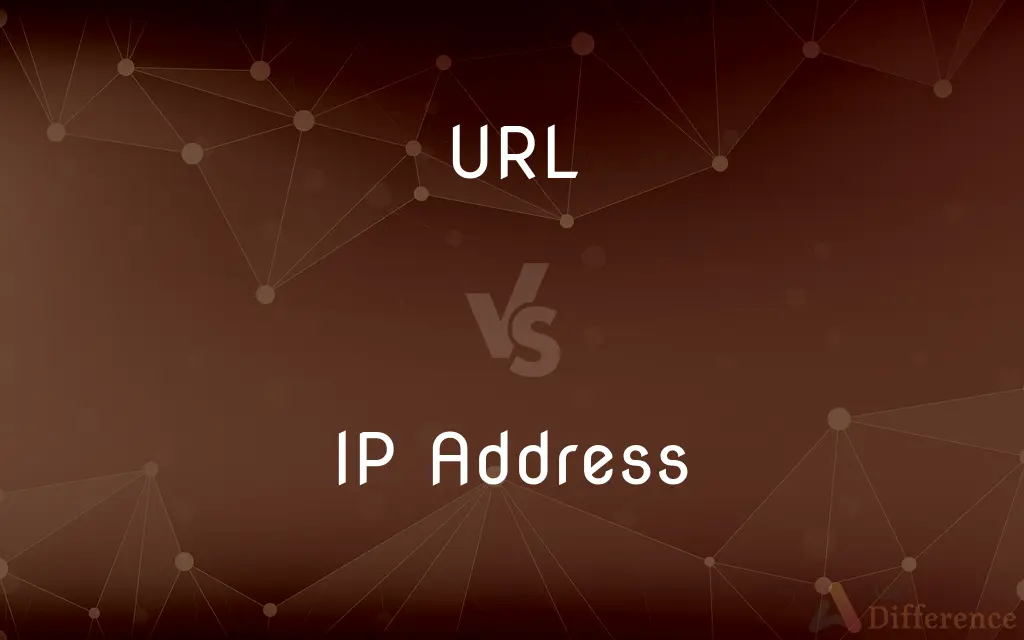URL vs. IP Address — What's the Difference?
By Tayyaba Rehman — Published on January 10, 2024
A URL (Uniform Resource Locator) is an address for accessing web resources, whereas an IP Address is a numerical label assigned to each device on a network.

Difference Between URL and IP Address
Table of Contents
ADVERTISEMENT
Key Differences
URLs (Uniform Resource Locators) and IP Addresses are fundamental concepts in the realm of the internet and networking. A URL is a specific character string that constitutes a reference to a resource on the internet. It's like the address of a specific webpage or file online. An IP Address, on the other hand, is a unique numerical label assigned to each device connected to a computer network that uses the Internet Protocol for communication. It serves as an identifier for a network or device.
URLs are designed to be easily readable and remembered by humans. They often include a domain name that is intuitive and represents the entity behind the website. IP Addresses are more technical and are used primarily by computers and networking equipment to route information. They consist of a series of numbers, which can be difficult for humans to remember.
The structure of a URL can include various components such as the protocol (like HTTP or HTTPS), domain name, path, and query parameters. This structure helps in navigating and accessing specific content on the internet. An IP Address is structured as a series of numbers separated by periods (in IPv4) or colons (in IPv6). This structure is integral to the underlying technology of the internet, ensuring accurate data transmission between devices.
While URLs are used to locate web resources, IP Addresses are used to identify the network or device through which these resources are accessed or delivered. In other words, a URL takes you to a specific destination on the internet, whereas an IP Address identifies each stop along the way.
URLs can be changed or redirected as needed. For example, a website can change its URL while maintaining the same content. IP Addresses can also change, especially with dynamic IP addressing in home networks, but each IP must remain unique within its network to avoid conflicts and ensure proper network communication.
ADVERTISEMENT
Comparison Chart
Definition
Address for accessing web resources
Numerical label for devices on a network
Primary Usage
Human-readable web navigation
Technical device identification
Structure
Protocol, domain, path, parameters
Series of numbers (IPv4 or IPv6)
Function
Locate web resources
Identify network or device
Changeability
Can be changed or redirected
Can change, must remain unique
Compare with Definitions
URL
URL is a human-readable form to access web content.
Typing a URL in a browser's address bar navigates to a web page.
IP Address
IP Address is a unique numerical identifier for devices on a network.
192.168.1.1 is a common IP address for home routers.
URL
It includes protocol, domain, and path to a resource.
The URL http://example.com/page directs to a specific page.
IP Address
IP Addresses are part of the Internet Protocol suite.
Each device on the internet has a unique IP address.
URL
URLs can contain specific query parameters for search.
Https://search.com/?q=books is a URL with a search query.
IP Address
It enables devices to communicate over a network.
A device sends data to another using its IP address.
URL
URL links to web resources like websites, images, files.
Clicking a URL can initiate a file download from a server.
IP Address
IP Addresses can be static or dynamic.
A static IP address remains constant, whereas a dynamic IP can change.
URL
URL is the web address for locating online resources.
Https://www.example.com is a URL for a website.
IP Address
There are two types: IPv4 and IPv6 addresses.
203.0.113.0 is an IPv4 address, while 2001:0db8:85a3:0000:0000:8a2e:0370:7334 is an IPv6 address.
URL
An internet address (for example, http://www.hmhco.com/about-hmh), usually consisting of the access protocol (http), the domain name (hmhco.com), and optionally the path to a file or resource residing on the server where the domain name resides (about-hmh).
URL
The address of a web page on the world wide web
Common Curiosities
What is the difference between IPv4 and IPv6 addresses?
IPv4 uses a 32-bit address format, while IPv6 uses a 128-bit format, allowing more unique addresses.
How is an IP Address used in networking?
An IP Address is used to identify devices and route data in a network.
Are URLs case-sensitive?
The domain part of a URL is not case-sensitive, but paths and parameters can be.
How do IP Addresses relate to domain names?
Domain names are translated to IP addresses through DNS (Domain Name System) for routing.
Can a website have multiple URLs?
Yes, a website can have multiple URLs pointing to the same or different content.
Can URLs contain IP Addresses?
Yes, URLs can contain IP addresses instead of domain names.
How do URLs and IP Addresses work together?
URLs are translated to IP addresses for routing data to the correct location.
What is a dynamic IP Address?
A dynamic IP Address can change each time a device connects to a network.
Is an IP Address specific to a device or network?
An IP Address can be specific to a device (public IP) or a network (private IP).
Are IP Addresses globally unique?
Public IP Addresses are globally unique, but private IP Addresses can be reused in different networks.
What does URL stand for?
URL stands for Uniform Resource Locator.
What is a static IP Address used for?
Static IP Addresses are often used for servers or devices needing a constant address.
Why are URLs important for the internet?
URLs provide an easy way for people to navigate the web and access information.
Can IP Addresses be traced to a location?
IP Addresses can often be traced to a general location but not precise addresses.
Can URLs link to non-web resources?
Yes, URLs can link to various resources like FTP servers or file shares.
Share Your Discovery

Previous Comparison
Electrolyte vs. Electrolysis
Next Comparison
Infrared Radiation vs. Ultraviolet RadiationAuthor Spotlight
Written by
Tayyaba RehmanTayyaba Rehman is a distinguished writer, currently serving as a primary contributor to askdifference.com. As a researcher in semantics and etymology, Tayyaba's passion for the complexity of languages and their distinctions has found a perfect home on the platform. Tayyaba delves into the intricacies of language, distinguishing between commonly confused words and phrases, thereby providing clarity for readers worldwide.













































